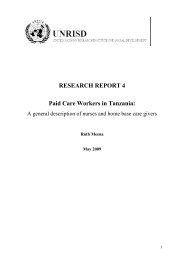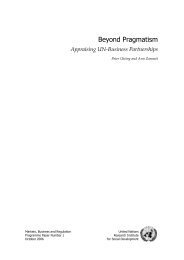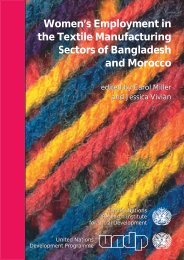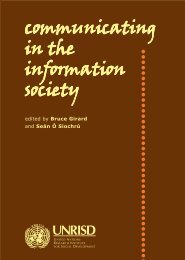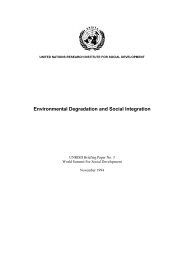The Politics of Gender and Reconstruction in Afghanistan
The Politics of Gender and Reconstruction in Afghanistan
The Politics of Gender and Reconstruction in Afghanistan
Create successful ePaper yourself
Turn your PDF publications into a flip-book with our unique Google optimized e-Paper software.
OPGP 4 – THE POLITICS OF GENDER AND RECONSTRUCTION IN AFGHANISTAN<br />
summary<br />
résumé<br />
resumen<br />
SUMMARY<br />
<strong>The</strong> central objective <strong>of</strong> this paper is to put the discussion <strong>of</strong> women’s rights <strong>in</strong> <strong>Afghanistan</strong> <strong>in</strong> the context <strong>of</strong> the<br />
multiple transitions entailed by the process <strong>of</strong> post-conflict reconstruction: a security transition (from war to<br />
peace), a political transition (to the formation <strong>of</strong> a legitimate <strong>and</strong> effective state) <strong>and</strong> a socioeconomic transition<br />
(from a “conflict” economy to susta<strong>in</strong>able growth). <strong>The</strong>se transformations do not occur <strong>in</strong> a social vacuum<br />
but build upon exist<strong>in</strong>g societal arrangements that condition <strong>and</strong> limit the range <strong>of</strong> available opportunities.<br />
<strong>The</strong> first section contextualizes current attempts at secur<strong>in</strong>g women’s rights <strong>in</strong> the troubled history <strong>of</strong> state-build<strong>in</strong>g<br />
<strong>and</strong> state-society relations <strong>in</strong> <strong>Afghanistan</strong>. <strong>The</strong> latter were marked by tensions between a rentier state bolstered<br />
by foreign subsidies, which had a relatively weak engagement with society, <strong>and</strong> a rural h<strong>in</strong>terl<strong>and</strong> that<br />
both resisted the <strong>in</strong>cursions <strong>of</strong> the state <strong>and</strong> attempted to represent tribal <strong>in</strong>terests with<strong>in</strong> it. Attempts at modernization,<br />
<strong>in</strong>clud<strong>in</strong>g the expansion <strong>of</strong> women’s rights, were <strong>in</strong>stigated by a male state elite whose bids to centralize<br />
power were thwarted at various junctures. <strong>The</strong> issue <strong>of</strong> women’s rights was used as a barga<strong>in</strong><strong>in</strong>g counter<br />
<strong>in</strong> contests between social forces whose geopolitical entanglements produced sharp sw<strong>in</strong>gs <strong>of</strong> the pendulum<br />
between extremes such as the Soviet-backed socialist experiment under the People’s Democratic Party <strong>of</strong><br />
<strong>Afghanistan</strong> (PDPA) <strong>and</strong> the Islamist policies <strong>of</strong> the Pakistani-backed Taliban. However, <strong>in</strong> a context where the<br />
state’s <strong>in</strong>terface with local communities, whether <strong>in</strong> terms <strong>of</strong> the legal framework, revenue collection or service<br />
delivery, was always limited, attempts to analyse women’s rights with reference only to government policies<br />
suffer from serious shortcom<strong>in</strong>gs. It is, rather, to the pr<strong>of</strong>ound transformations brought about by years <strong>of</strong> protracted<br />
conflict that one must look for a better appraisal <strong>of</strong> obstacles to <strong>and</strong> opportunities for more genderequitable<br />
development <strong>in</strong> <strong>Afghanistan</strong>.<br />
<strong>The</strong> second section discusses the implications <strong>of</strong> the far-reach<strong>in</strong>g changes <strong>in</strong> social relations brought about by<br />
years <strong>of</strong> war <strong>and</strong> displacement follow<strong>in</strong>g the Soviet <strong>in</strong>vasion <strong>of</strong> <strong>Afghanistan</strong>. A predom<strong>in</strong>antly rural country<br />
whose population achieved relatively self-sufficient livelihoods was transformed <strong>in</strong>to a fragmented polity<br />
where a significant proportion <strong>of</strong> the economy is based on illicit, crim<strong>in</strong>alized networks <strong>of</strong> trade <strong>in</strong> drugs (opium<br />
poppy, <strong>in</strong> particular) <strong>and</strong> commodities such as timber <strong>and</strong> emeralds, smuggl<strong>in</strong>g <strong>of</strong> goods <strong>and</strong> human traffick<strong>in</strong>g.<br />
<strong>The</strong> central argument put forward <strong>in</strong> this section is that rout<strong>in</strong>e violations <strong>of</strong> women’s rights <strong>in</strong> <strong>Afghanistan</strong><br />
are determ<strong>in</strong>ed by analytically dist<strong>in</strong>ct but overlapp<strong>in</strong>g <strong>and</strong> mutually re<strong>in</strong>forc<strong>in</strong>g sets <strong>of</strong> <strong>in</strong>fluences: the dynamics<br />
<strong>of</strong> gendered disadvantage, the erosion <strong>of</strong> local livelihoods <strong>and</strong> grow<strong>in</strong>g poverty, the crim<strong>in</strong>alization <strong>of</strong> the<br />
economy, <strong>and</strong> <strong>in</strong>security due to the predations <strong>of</strong> armed groups <strong>and</strong> factions. Particular comb<strong>in</strong>ations <strong>of</strong> new<br />
pressures (such as poverty, <strong>in</strong>debtedness <strong>and</strong> predation by local strongmen) <strong>and</strong> exist<strong>in</strong>g practices (such as the<br />
early marriage <strong>of</strong> girls aga<strong>in</strong>st the payment <strong>of</strong> brideprice) create outcomes that may easily be misidentified as<br />
unmediated expressions <strong>of</strong> local “culture”, thus detract<strong>in</strong>g critical attention from the full nexus <strong>of</strong> <strong>in</strong>fluences that<br />
deepen the vulnerability <strong>of</strong> girls <strong>and</strong> women.<br />
PAGE vi




